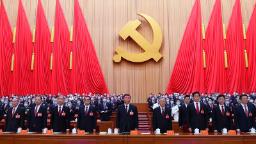[ad_1]

CNN
—
Chinese leader Xi Jinping has formally stepped into his third term ruling China with an iron grip on power, breaking with recent precedent to secure another five years in power, as he revealed a top leadership body stacked with loyal allies.
On Sunday, following the close of the Communist Party Congress, seven men – namely Xi Jinping, Li Qiang, Zhao Leji, Wang Huning, Cai Qi, Li Xi and Ding Xuexiang – were announced as members of the Politburo Standing Committee, China’s top ruling body.
They now compose the Politburo Standing Committee, China’s most powerful decision-making body, and will sit atop of the party to drive the world’s second-largest economy over the coming half decade.
The line-up was more stacked with staunch Xi loyalists that some watchers of elite Chinese politics had predicted – making clear that Xi has consolidated his power both in the public eye and in the closed-door meetings where leadership decisions are made.
Noticeably absent from the line-up was Hu Chunhua, 59, a vice premier outside Xi’s orbit who had previously been touted as a potential successor to Xi and a candidate for the Standing Committee.
Instead, Xi had filled the four open spots on the seven-member body with Xi long-time allies and proteges, Li Qiang, Cai Qi, Ding Xuexiang and Li Xi, clearing the path for him to rule for a third term with minimal internal resistance – and underlining that affinity to Xi trumps all else in China’s current political landscape.
“The current situation is something unprecedented … this new line-up is not a product of power sharing or horse trading among different factions, but basically it is the result or consequence from Xi’s authority,” said Chen Gang, senior research fellow at the National University of Singapore’s East Asian Institute.
“For the party’s decision-making, I think that we have entered a really a new era, as Xi now controls almost every aspect concerning policy making and decision making … we’re seeing a kind of re-centralised bureaucracy in China, which will definitely impact the future China’s economic foreign policy trajectory,” he said.
Source link



